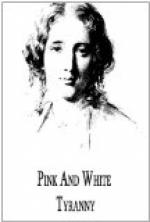“Lillie, Lillie,” said John, “this is too much! Don’t you think that I suffer at all?”
“I don’t see that you do,” said Lillie, sobbing. “I dare say you are glad of it; it is just like you. Oh, dear, I wish I had never been married!”
“I certainly do,” said John, fervently.
“I suppose so. You see, it is nothing to you men; you don’t care any thing about these things. If you can get a musty old corner and your books, you are perfectly satisfied; and you don’t know when things are pretty, and when they are not: and so you can talk grand about your honor and your conscience and all that. I suppose the carriages and horses have got to be sold too?”
“Certainly, Lillie,” said John, hardening his heart and his tone.
“Well, well,” she said, “I wish you would go now and send ma to me. I don’t want to talk about it any more. My head aches as if it would split. Poor ma! She little thought when I married you that it was going to come to this.”
John walked out of the room gloomily enough. He had received this morning his check-mate. All illusion was at an end. The woman that he had loved and idolized and caressed and petted and indulged, in whom he had been daily and hourly disappointed since he was married, but of whom he still hoped and hoped, he now felt was of a nature not only unlike, but opposed to his own. He felt that he could neither love nor respect her further. And yet she was his wife, and the mother of his daughter, and the only queen of his household; and he had solemnly promised at God’s altar that “forsaking all others, he would keep only unto her, so long as they both should live, for better, for worse,” John muttered to himself,—“for better, for worse. This is the worse; and oh, it is dreadful!”
In all John’s hours of sorrow and trouble, the instinctive feeling of his heart was to go back to the memory of his mother; and the nearest to his mother was his sister Grace. In this hour of his blind sorrow, he walked directly over to the little cottage on Elm Street, which Grace and her husband had made a perfectly ideal home.
When he came into the parlor, Grace and Rose were sitting together with an open letter lying between them. It was evident that some crisis of tender confidence had passed between them; for the tears were hardly dry on Rose’s cheeks. Yet it was not painful, whatever it was; for her face was radiant with smiles, and John thought he had never seen her look so lovely. At this moment the truth of her beautiful and lovely womanhood, her sweetness and nobleness of nature, came over him, in bitter contrast with the scene he had just passed through, and the woman he had left.
“What do you think, John?” said Grace; “we have some congratulations here to give! Rose is engaged to Harry Endicott.”
“Indeed!” said John, “I wish her joy.”
“But what is the matter, John?” said both women, looking up, and seeing something unusual in his face.




